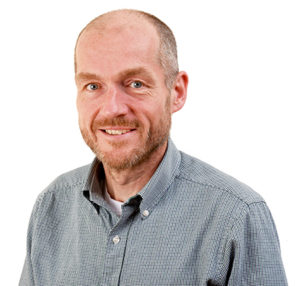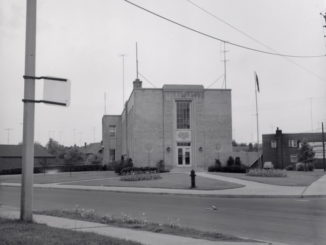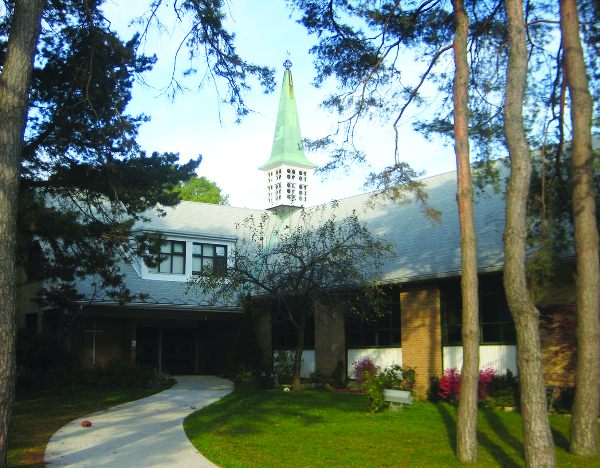
The return of Bellwood Health Services to the site of the former Donwood Institute (see the December issue of Leaside Life) opens a new chapter in an important Leaside story that deserves to be better known.
The name Bellwood recognizes Dr. R. Gordon Bell, a trail-blazing pioneer in addiction treatment. When he opened the Donwood on the ravine-edge setting atop Brentcliffe Rd in March 1967, it was the first public hospital for the treatment of alcohol addiction in Canada, and one of the first in North America.
Bell was born in 1911 on a farm near St. Mary’s, Ont. and enrolled in medical studies at the University of Toronto in 1930. Although he failed his third year, spent nearly five of the Depression years working to pay his way, and got married, he eventually returned to his studies in 1939. The Canadian military urgently needed more doctors during the war, so medical training was accelerated.
 Bell graduated just as authorities were becoming alarmed about the number of soldiers suffering from anxiety or depression, or breaking down emotionally and needing to be discharged. He was assigned to create a treatment facility for soldiers with what we today call Post Traumatic Stress Disorder (PTSD). With no official budget for staff or equipment, and no guidelines on what kind of programming to offer, “the situation led to some ingenious ad-lib planning,” according to A Special Calling: My Life in Addiction Treatment and Care, by R. Gordon Bell with Stan Solomon (Stoddart Publishing Co. Limited, 1989).
Bell graduated just as authorities were becoming alarmed about the number of soldiers suffering from anxiety or depression, or breaking down emotionally and needing to be discharged. He was assigned to create a treatment facility for soldiers with what we today call Post Traumatic Stress Disorder (PTSD). With no official budget for staff or equipment, and no guidelines on what kind of programming to offer, “the situation led to some ingenious ad-lib planning,” according to A Special Calling: My Life in Addiction Treatment and Care, by R. Gordon Bell with Stan Solomon (Stoddart Publishing Co. Limited, 1989).
Post-war, Bell decided to set up a clinic to treat people with emotional disorders. He was advised to start small by taking advantage of an obscure regulation allowing doctors to take up to four patients into their own home. “I had no idea at the time that our only patients would be alcoholics,” he wrote.
As he had with his PTSD patients, Bell improvised. “Lacking any other plan, we restricted treatment to cutting off alcoholic intake, and giving [patients] lots of attention and plenty of good food – a basic formula for initiating treatment that we really haven’t had to change much over the years.”
The stigma attached to alcoholics in those days also applied to the doctors treating them; it was an unpopular field that attracted very few physicians. With little in the medical literature of the day to guide him, Bell felt very much on his own. But he persisted. Treating patients, listening, learning and experimenting through the 1950s, Bell gradually developed greater insight into the social causes of addiction. Building social supports for patients increasingly became a focus of treatment.
Bell moved the clinic out of his home but maintained the residential care model in a series of increasingly larger clinic sites around Toronto. In 1964, he heard about property in North Leaside and began plans to move there. But how would Leasiders react to the prospect of a hospital for alcoholics in their midst? During a public meeting a man stood up and yelled, “Do you realise that these people plan to build an asylum at our very doorstep?” “It’s obvious to me,” Bell responded immediately, “that you have serious misconceptions about the kind of patients who would come to Donwood. They are the same kind of people who live on your street, work with you, and are members of your family. You can be very sure of one thing: there will be less drinking at the Donwood address than at most other addresses in Leaside!”
It’s a measure of how Leasiders’ attitudes have evolved in 50 years that, at the public meeting in October 2015 about the return of Bellwood to North Leaside, the only issue raised was the potential impact on traffic.
Construction of the Leaside clinic was completed in January 1967, the furnishings and decorating in February, and the first patients arrived in March – a half century ago this winter.
From the beginning, building a network of community volunteers around the recovering patients was a priority. Dr. Bell’s daughter, Linda, who worked closely with her father throughout the Donwood years, recalls, “Many families, women from North Leaside in particular, participated. Volunteers were trained to understand addiction, to be a friend to the patient and became part of the support care groups. They would keep in touch to see how former patients were doing; sometimes these relationships continued for many years afterwards.”
Dr. Bell left the Donwood in 1983, along with his daughter Linda, to establish Bellwood Health Services Inc., an independent operation. In 1998, the Donwood became part of a new entity, the Centre for Addiction and Mental Health, and in 2007 moved to the CAMH Queen St. campus. Bellwood has operated continuously in Toronto since 1985, most recently as part of the Edgewood Health Network, now returning to the site of the Donwood founded by its namesake – a homecoming 50 years in the making.
Dr. R. Gordon Bell died in 2005 at the age of 93, but his legacy lives on.





